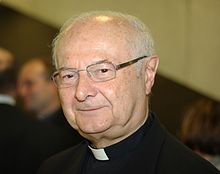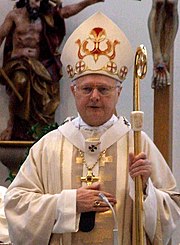In the canon law of the Catholic Church, the loss of clerical state is the removal of a bishop, priest, or deacon from the status of being a member of the clergy.

The Archdiocese of Milwaukee is a Latin Church ecclesiastical territory, or archdiocese, of the Catholic Church in southeast Wisconsin in the United States. The Archdiocese of Milwaukee is the metropolitan see of the ecclesiastical province of Milwaukee. It includes the suffragan dioceses of Green Bay, La Crosse, Madison, and Superior.

The Archdiocese of St. Louis is a Latin Church ecclesiastical territory, or archdiocese, of the Catholic Church in the eastern part of the U.S. state of Missouri.
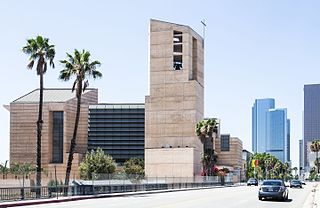
The Archdiocese of Los Angeles is a Latin Church ecclesiastical territory or archdiocese of the Catholic Church located in the southern coastal portion of the U.S. state of California. The archdiocese's cathedra is in Los Angeles, and the archdiocese comprises the California counties of Los Angeles, Santa Barbara and Ventura. The cathedral is the Cathedral of Our Lady of the Angels in Los Angeles, and its present archbishop is José Horacio Gómez Velasco. With over five million professing members and weekly liturgies celebrated in 32 languages, the Archdiocese of Los Angeles is numerically the single largest and most ethnically diverse archdiocese in the United States.

Karl Lehmann was a German prelate and cardinal of the Catholic Church. He served as Bishop of Mainz from 1983 to 2016, being elevated to the cardinalate in 2001.

The Apostolic Movement of Schoenstatt is a Catholic Marian movement founded in Germany in 1914 by Fr Joseph Kentenich, who saw the movement as a means of spiritual renewal for the Catholic Church. The movement is named after the small locality of Schönstatt which is part of the town of Vallendar near Koblenz, in Germany.

Roger Michael Mahony is an American cardinal and retired prelate of the Catholic Church who served as archbishop of the Archdiocese of Los Angeles in California from 1985 to 2011. Before his appointment, he served as an auxiliary bishop of the Diocese of Fresno from 1975 to 1980 and bishop of the Diocese of Stockton from 1980 to 1985.

Darío del Niño Jesús Castrillón Hoyos was a Colombian cardinal of the Catholic Church. He was Prefect of the Congregation for the Clergy from 1996 to 2006 and President of the Pontifical Commission Ecclesia Dei from 2000 until his retirement in 2009. He was made a cardinal in 1998.
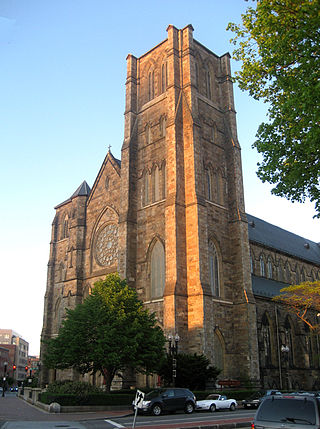
The Metropolitan Archdiocese of Boston is a Latin Church ecclesiastical territory, or archdiocese, of the Catholic Church in eastern Massachusetts in the United States. Its mother church is the Cathedral of the Holy Cross in Boston. The archdiocese is the fourth largest in the United States.

The Archdiocese of Freiburg im Breisgau is a Latin Church diocese of the Catholic Church in Baden-Württemberg comprising the former states of Baden and Hohenzollern. The Archdiocese of Freiburg is led by an archbishop, who also serves as the metropolitan bishop of the Upper-Rhine ecclesiastical province for the suffragan dioceses of Mainz and Rottenburg-Stuttgart. Its seat is Freiburg Minster in Freiburg im Breisgau.
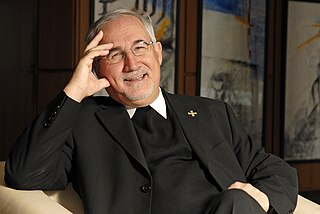
Gebhard Fürst is a German prelate of the Catholic Church who was the Bishop of Rottenburg-Stuttgart from 2000 to 2023.

Joseph Höffner was a German cardinal of the Roman Catholic Church. He served as the Archbishop of Cologne from 1969 to 1987 and was elevated to the cardinalate in 1969.
The German Bishops' Conference is the episcopal conference of the bishops of the Roman Catholic dioceses in Germany. Members include diocesan bishops, coadjutors, auxiliary bishops, and diocesan administrators.

Reinhard Marx is a German cardinal of the Catholic Church. He serves as the Archbishop of Munich and Freising. Pope Benedict XVI elevated Marx to the cardinalate in a consistory in 2010.

Franz Hengsbach was a German Cardinal of the Roman Catholic Church who served as Bishop of Essen from 1957 to 1991, and was elevated to the cardinalate in 1988.

The Diocese of Limburg is a Latin Church diocese of the Catholic Church in Germany. It belongs to the ecclesiastical province of Cologne, with metropolitan see being the Archdiocese of Cologne.
Francisco José Cox Huneeus was a native of Chile and a former archbishop of the Catholic Church. He was a member of the Schoenstatt Movement. He was Bishop of Chillán from 1975 to 1981 and Coadjutor Archbishop of La Serena from 1985 to 1990 and Archbishop there from 1990 to 1997, when he resigned following accusations that he had sexually abused young boys. He was laïcized in 2018.

Rainer Maria Woelki is a German Cardinal of the Catholic Church. He has been Archbishop of Cologne since his installation on 20 September 2014 following his election by the Cathedral Chapter to succeed Joachim Meisner in that position. He previously served as Archbishop of Berlin.

Stephan Burger is a German Roman Catholic clergyman. Since 2014 he has been Archbishop of Freiburg and Metropolitan Bishop of the Ecclesiastical Province of Freiburg.

Udo Marcus Bentz is a German prelate of the Catholic Church who has been named the metropolitan archbishop of Paderborn. He was an auxiliary bishop in Mainz from 2015 to 2023.
